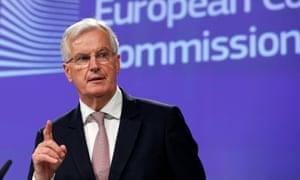We are asked to endorse a ‘vision’ of higher productivity and economic growth and create an extra layer of bureaucracy to support it. The problem is that the vision bears little relation to reality. The ambition is to double the regional economy in 18 years, i.e. to increase its size by 100% – this requires a compound growth rate of 3.94%. In the real world, the actual growth rate in the SW over the last 18 years has been 30% and the annual rate 1.47%. Nationally, the UK economy has never grown by more than 3% p.a. in any of the last 18 years, and is currently veering downwards below 1.5%.
Futures Forum: Devolution proposals for Devon and Somerset >>> "focusing on delivering improved productivity" or "an unelected, one-party combined authority"?
As reported from the EU last week:
Accelerating eurozone set to outstrip Britain at time of Brexit, commission believes
Jim Brunsden and Mehreen Khan Brussels184 comments
The UK is set to have the lowest growth of almost any EU country when it leaves the bloc in 2019, according to forecasts from the European Commission that show Britain being outstripped by an accelerating eurozone. Brussels’ latest economic forecasts predict that UK growth will fall to 1.1 per cent in 2019, only marginally ahead of Italy and far behind the 1.9 per cent growth predicted for the euro area. The commission has also lowered its forecast for growth in Britain in 2017 compared with its last set of figures in May.
The commission said the downbeat assessment reflected the impact of higher inflation on the economy and that growth was “expected to remain subdued over the forecast horizon”. Brexit “uncertainty is continuing to weigh on investment” in the UK while inflation is hitting consumer purchasing power, Pierre Moscovici, the EU’s economy commissioner, said.
UK growth will lag behind most of EU, Brussels forecasts
Does that make it a particularly good time to jump ship?
With us or US? Barnier challenges May on the kind of society UK wants
Michel Barnier says Britain’s answer is important because it will direct discussions on a future relationship with the EU

The EU’s chief Brexit negotiator, Michel Barnier. Photograph: Francois Lenoir/Reuters
Daniel Boffey and Jennifer Rankin in Brussels
Thursday 9 November 2017
The EU’s chief Brexit negotiator, Michel Barnier, has challenged Theresa May’s beleaguered government to address the fundamental question of whether Britain wants to deregulate and follow the US social and economic model or stay within the European mainstream.
Speaking in Rome, Barnier voiced his concern over recent comments by the US commerce secretary on a visit to London, with whom the trade secretary, Liam Fox, is in discussions over a future trade deal.
“When I hear the US secretary of commerce, Wilbur Ross call, in London for the British to diverge with Europe to better converge towards others – towards less regulation, environmental, sanitary, food, probably also financial, fiscal and social – I’m wondering”, Barnier said. “The United Kingdom has chosen to leave the European Union. Will it also want to move away from the European model? That’s another question.
“There is behind this European regulatory framework the fundamental societal choices we hold: the social market economy, health protection, food security, fair and efficient financial regulation … it is up to the British to tell us whether they still adhere to the European model. Their answer is important because it directs the discussion on our future partnership and the conditions of its ratification.”
During his visit to the UK earlier this week, Ross said he was hopeful an initial scoping exercise on a UK-US trade deal could bear fruit, but that he would want to see the British government drop regulations that he believed did not have scientific foundation, such as the ban on US chlorinated chicken. Ross had also described the EU as protectionist.
Speaking as the EU and British Brexit negotiating teams resumed talks in Brussels without their principal negotiators, Barnier said the EU would not allow Britain to undercut the bloc’s regulatory standard in place. “There will be no close commercial relationship without a level playing field”, he said...
The latest round of talks kicked off as the European commission said the UK would have almost the slowest economic growth of any EU country when it leaves the bloc in 2019.
According to the commission’s autumn forecast, the British economy will grow 1.1% in 2019, only slightly ahead of Italy, and far behind the 1.9% expansion across the eurozone. The forecast is based on the theoretical assumption the EU and UK will maintain the status quo after Brexit day, but takes into account business uncertainty that is choking off investment.
With us or US? Barnier challenges May on the kind of society UK wants | Politics | The Guardian
.
.
.
No comments:
Post a Comment